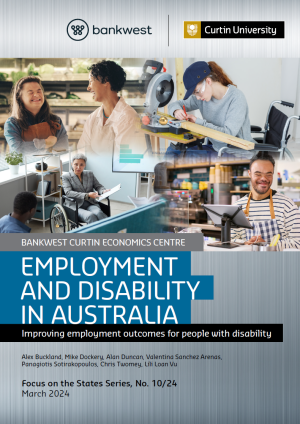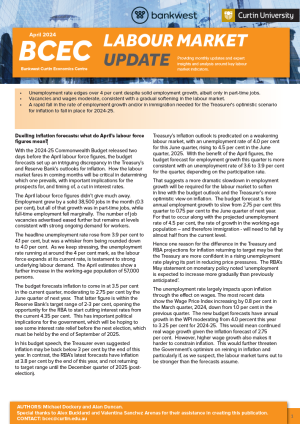Publications
Rain, Rain, Go Away: Weather and children’s time allocation
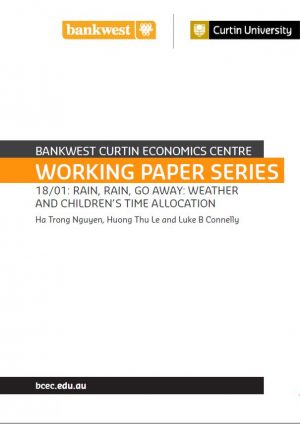 This paper presents the first robust causal estimates of the effect of weather on the allocation of children’s time. It uses individual-level data from over 45,000 time-use diaries of children from two nationally representative cohorts of Australian children whose time-use... Read article
This paper presents the first robust causal estimates of the effect of weather on the allocation of children’s time. It uses individual-level data from over 45,000 time-use diaries of children from two nationally representative cohorts of Australian children whose time-use... Read article
 This paper presents the first robust causal estimates of the effect of weather on the allocation of children’s time. It uses individual-level data from over 45,000 time-use diaries of children from two nationally representative cohorts of Australian children whose time-use... Read article
This paper presents the first robust causal estimates of the effect of weather on the allocation of children’s time. It uses individual-level data from over 45,000 time-use diaries of children from two nationally representative cohorts of Australian children whose time-use... Read article
Housing affordability: Land supply and new housing in Western Australia
 This Feature report addresses the topic of land supply, new dwelling construction and housing affordability, a major economic and social issue facing West Australian households. This report complements the BCEC Housing Affordability (2014 and 2016) reports through analysis of similar broad regional... Read article
This Feature report addresses the topic of land supply, new dwelling construction and housing affordability, a major economic and social issue facing West Australian households. This report complements the BCEC Housing Affordability (2014 and 2016) reports through analysis of similar broad regional... Read article
 This Feature report addresses the topic of land supply, new dwelling construction and housing affordability, a major economic and social issue facing West Australian households. This report complements the BCEC Housing Affordability (2014 and 2016) reports through analysis of similar broad regional... Read article
This Feature report addresses the topic of land supply, new dwelling construction and housing affordability, a major economic and social issue facing West Australian households. This report complements the BCEC Housing Affordability (2014 and 2016) reports through analysis of similar broad regional... Read article
Inequality in later life: The superannuation effect
 This BCEC Feature report examines the extent of economic inequality among Australians over 55 years of age, and seeks to identify the effect, if any, that the current superannuation system has on economic inequality in later life. The report examines inequality by reference... Read article
This BCEC Feature report examines the extent of economic inequality among Australians over 55 years of age, and seeks to identify the effect, if any, that the current superannuation system has on economic inequality in later life. The report examines inequality by reference... Read article
 This BCEC Feature report examines the extent of economic inequality among Australians over 55 years of age, and seeks to identify the effect, if any, that the current superannuation system has on economic inequality in later life. The report examines inequality by reference... Read article
This BCEC Feature report examines the extent of economic inequality among Australians over 55 years of age, and seeks to identify the effect, if any, that the current superannuation system has on economic inequality in later life. The report examines inequality by reference... Read article
The nexus between equity markets and housing prices in Australia
 This BCEC Feature report examines the impact of equity and energy prices on house prices across Australian capital cities and regional Western Australia, over the period 2000 to 2014. Energy prices, for the purposes of this study, refers to a broad range... Read article
This BCEC Feature report examines the impact of equity and energy prices on house prices across Australian capital cities and regional Western Australia, over the period 2000 to 2014. Energy prices, for the purposes of this study, refers to a broad range... Read article
 This BCEC Feature report examines the impact of equity and energy prices on house prices across Australian capital cities and regional Western Australia, over the period 2000 to 2014. Energy prices, for the purposes of this study, refers to a broad range... Read article
This BCEC Feature report examines the impact of equity and energy prices on house prices across Australian capital cities and regional Western Australia, over the period 2000 to 2014. Energy prices, for the purposes of this study, refers to a broad range... Read article
The income tax treatment of housing assets: an assessment of proposed reform arrangements
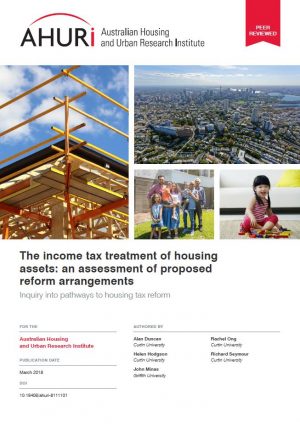 This report models several potential transitional arrangements that may ease the distribution pressures arising from reforms to negative gearing and capital gains tax (CGT) reform, and help smooth a reform pathway that is more politically acceptable. Negative gearing and CGT... Read article
This report models several potential transitional arrangements that may ease the distribution pressures arising from reforms to negative gearing and capital gains tax (CGT) reform, and help smooth a reform pathway that is more politically acceptable. Negative gearing and CGT... Read article
 This report models several potential transitional arrangements that may ease the distribution pressures arising from reforms to negative gearing and capital gains tax (CGT) reform, and help smooth a reform pathway that is more politically acceptable. Negative gearing and CGT... Read article
This report models several potential transitional arrangements that may ease the distribution pressures arising from reforms to negative gearing and capital gains tax (CGT) reform, and help smooth a reform pathway that is more politically acceptable. Negative gearing and CGT... Read article
Gender Equity Insights 2018: Inside Australia’s Gender Pay Gap
 This third report in the BCEC|WGEA Gender Equity Insights series extends and strengthens the evidence base around gender pay gaps and how these have changed over time across Australian workplaces. The report uses unique data reported to the WGEA, capturing 4... Read article
This third report in the BCEC|WGEA Gender Equity Insights series extends and strengthens the evidence base around gender pay gaps and how these have changed over time across Australian workplaces. The report uses unique data reported to the WGEA, capturing 4... Read article
 This third report in the BCEC|WGEA Gender Equity Insights series extends and strengthens the evidence base around gender pay gaps and how these have changed over time across Australian workplaces. The report uses unique data reported to the WGEA, capturing 4... Read article
This third report in the BCEC|WGEA Gender Equity Insights series extends and strengthens the evidence base around gender pay gaps and how these have changed over time across Australian workplaces. The report uses unique data reported to the WGEA, capturing 4... Read article
IMF Technical Assistance Report to the People’s Republic of China: Tax Policy and Employment Creation
 BCEC Director Alan Duncan was invited to be part of an International Monetary Fund (IMF) Expert Mission to the People’s Republic of China, to prepare a Technical Assistance Report on the impact of tax policy on employment in China. The... Read article
BCEC Director Alan Duncan was invited to be part of an International Monetary Fund (IMF) Expert Mission to the People’s Republic of China, to prepare a Technical Assistance Report on the impact of tax policy on employment in China. The... Read article
 BCEC Director Alan Duncan was invited to be part of an International Monetary Fund (IMF) Expert Mission to the People’s Republic of China, to prepare a Technical Assistance Report on the impact of tax policy on employment in China. The... Read article
BCEC Director Alan Duncan was invited to be part of an International Monetary Fund (IMF) Expert Mission to the People’s Republic of China, to prepare a Technical Assistance Report on the impact of tax policy on employment in China. The... Read article
Constitutions and the Political Agency of Women: A Cross-Country Study
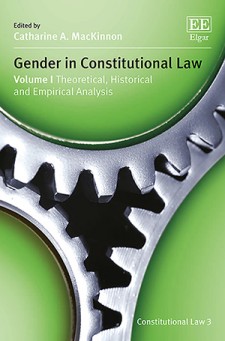 Gender in Constitutional Law is a comprehensive three-volume collection of formative and influential scholarship in a dynamic area of legal development and social change. Compiling theoretical, empirical, and practical analyses from leading scholars, judges, and nongovernmental organizations around the world, these volumes... Read article
Gender in Constitutional Law is a comprehensive three-volume collection of formative and influential scholarship in a dynamic area of legal development and social change. Compiling theoretical, empirical, and practical analyses from leading scholars, judges, and nongovernmental organizations around the world, these volumes... Read article
 Gender in Constitutional Law is a comprehensive three-volume collection of formative and influential scholarship in a dynamic area of legal development and social change. Compiling theoretical, empirical, and practical analyses from leading scholars, judges, and nongovernmental organizations around the world, these volumes... Read article
Gender in Constitutional Law is a comprehensive three-volume collection of formative and influential scholarship in a dynamic area of legal development and social change. Compiling theoretical, empirical, and practical analyses from leading scholars, judges, and nongovernmental organizations around the world, these volumes... Read article
BCEC Monthly Labour Market Update – January 2018
 Welcome to the ninth edition of the BCEC Monthly Labour Market Update. Produced monthly, this economic commentary explores the latest labour force data released by the Australian Bureau of Statistics (ABS), providing expert insights and analysis around key labour market indicators. Key findings from January... Read article
Welcome to the ninth edition of the BCEC Monthly Labour Market Update. Produced monthly, this economic commentary explores the latest labour force data released by the Australian Bureau of Statistics (ABS), providing expert insights and analysis around key labour market indicators. Key findings from January... Read article
 Welcome to the ninth edition of the BCEC Monthly Labour Market Update. Produced monthly, this economic commentary explores the latest labour force data released by the Australian Bureau of Statistics (ABS), providing expert insights and analysis around key labour market indicators. Key findings from January... Read article
Welcome to the ninth edition of the BCEC Monthly Labour Market Update. Produced monthly, this economic commentary explores the latest labour force data released by the Australian Bureau of Statistics (ABS), providing expert insights and analysis around key labour market indicators. Key findings from January... Read article
The evolution of the gender test score gap through seventh grade: new insights from Australia using unconditional quantile regression and decomposition
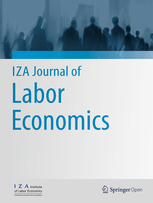 This paper documents the patterns and examines the factors contributing to a gender gap in educational achievements in early seventh grade of schooling using a recent and nationally representative panel of Australian children. Regression results indicate that females excel at... Read article
This paper documents the patterns and examines the factors contributing to a gender gap in educational achievements in early seventh grade of schooling using a recent and nationally representative panel of Australian children. Regression results indicate that females excel at... Read article
 This paper documents the patterns and examines the factors contributing to a gender gap in educational achievements in early seventh grade of schooling using a recent and nationally representative panel of Australian children. Regression results indicate that females excel at... Read article
This paper documents the patterns and examines the factors contributing to a gender gap in educational achievements in early seventh grade of schooling using a recent and nationally representative panel of Australian children. Regression results indicate that females excel at... Read article
Small Business Enterprise Models of Employment
 Adults with disabilities are substantially disadvantaged, economically and socially. Ample national and international comparative data indicate low labour force participation rates (just over 50%) and double the unemployment rates for persons without disabilities. This report examines an emerging small business employment model that... Read article
Adults with disabilities are substantially disadvantaged, economically and socially. Ample national and international comparative data indicate low labour force participation rates (just over 50%) and double the unemployment rates for persons without disabilities. This report examines an emerging small business employment model that... Read article
 Adults with disabilities are substantially disadvantaged, economically and socially. Ample national and international comparative data indicate low labour force participation rates (just over 50%) and double the unemployment rates for persons without disabilities. This report examines an emerging small business employment model that... Read article
Adults with disabilities are substantially disadvantaged, economically and socially. Ample national and international comparative data indicate low labour force participation rates (just over 50%) and double the unemployment rates for persons without disabilities. This report examines an emerging small business employment model that... Read article
BCEC Newsletter Edition #4 January 2018
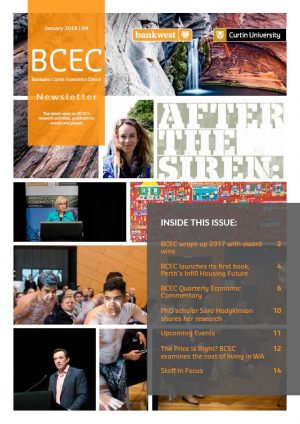 As 2017 came to an end, we had many reasons to celebrate. Last year was the Centre’s most successful yet, as evidenced by a suite of award wins for our research activities and the impact they have had. My warmest congratulations to Rebecca Cassells,... Read article
As 2017 came to an end, we had many reasons to celebrate. Last year was the Centre’s most successful yet, as evidenced by a suite of award wins for our research activities and the impact they have had. My warmest congratulations to Rebecca Cassells,... Read article
 As 2017 came to an end, we had many reasons to celebrate. Last year was the Centre’s most successful yet, as evidenced by a suite of award wins for our research activities and the impact they have had. My warmest congratulations to Rebecca Cassells,... Read article
As 2017 came to an end, we had many reasons to celebrate. Last year was the Centre’s most successful yet, as evidenced by a suite of award wins for our research activities and the impact they have had. My warmest congratulations to Rebecca Cassells,... Read article

